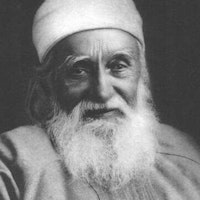His [Christ’s] essential teaching was the unity of mankind and the attainment of supreme human virtues through love.
'Abdu'l-Bahá

Christ’s Essential Teaching
Topic: Global Peace & Development
His [Christ’s] essential teaching was the unity of mankind and the attainment of supreme human virtues through love. He came to establish the Kingdom of peace and everlasting life. Can you find in His words any justification for discord and enmity? The purpose of His life and the glory of His death were to set mankind free from the sins of strife, war and bloodshed.
Abdu’l-Bahá, born Abbas Effendi in May 1844, was an influential religious figure known for his leadership in the Baha’i Faith following the death of his father, Baha'u'llah, the faith's founder, in 1892. His birthplace was Tehran, Iran, a significant location in the history of the Baha'i Faith. Growing up, he witnessed his father's exile due to religious persecution, an experience that deeply impacted his later work and teachings. As the eldest son, he was intimately involved in his father's mission, gaining a profound understanding of the Baha'i teachings. His early life was marked by turmoil and displacement, enduring exiles to Baghdad, Constantinople, Adrianople, and finally to Acre, in the Ottoman Empire. These experiences of adversity and displacement shaped his compassionate worldview.
Upon his father's passing, Abdu'l-Bahá became the appointed leader of the Baha'i community. He played a crucial role in interpreting Baha'u'llah's teachings and ensuring their dissemination. His leadership period was characterized by a significant expansion of the Baha'i Faith, both in the Middle East and internationally. He was known for his charismatic personality, deep spiritual insight, and commitment to the principles of peace, unity, and equality. Abdu'l-Bahá's efforts to spread the Baha'i teachings took a monumental turn when he embarked on a series of travels to the West, visiting Europe and North America between 1911 and 1913. These journeys were pivotal in bringing the Baha'i message to a broader audience, emphasizing the faith's core principles of unity, equality, and world peace.
Abdu’l-Bahá passed away in Haifa, in present-day Israel, on November 28, 1921. His death marked the end of an era for the Baha'i community but left a lasting legacy through his writings, discourses, and the example he set through his life. He was widely recognized for his humanitarian work, his commitment to social justice, and his efforts to promote interfaith dialogue. His teachings and actions continue to inspire Baha'is around the world, serving as a guiding light for the principles of service, unity, and peace central to the Baha'i Faith. His writings and talks, many of which have been preserved, offer a profound insight into the spiritual and practical aspects of the Baha'i teachings and remain a key part of Baha'i literature.
The Promulgation of Universal Peace
Bahá, 'Abdu'l. The Promulgation of Universal Peace: Talks Delivered by 'Abdu'l-Bahá during His Visit to the United States and Canada in 1912. Bahá'i Publishing Trust, 1982. ['Abdu'l-Bahá, The Promulgation of Universal Peace].

'Abdu'l-Bahá
Theme: Peace

‘Abdu’l-Bahá, The Promulgation of Universal Peace
From a talk, New York, 14 April 1912; ‘The Promulgation of Universal Peace: Talks Delivered by ‘Abdu’l-Bahá during His Visit to the United States and Canada in 1912.
Additional Abdu’l-Baha Quotes
‘Abdu’l-Bahá on Christ and Christianity [Excerpt]
‘Abdu’l-Bahá: “His Holiness Christ said: “The Father is in me.” This we must understand through logical and scientific evidences, for if we do not conform religious principles with science and reason, they do not inspire the heart with confidence and assurance.
It is said that once John of Chrysostom was walking along the seashore, thinking over the question of the trinity, trying to reconcile it with finite reason. Suddenly his attention was attracted by a boy sitting on the shore, putting water into a cup. Approaching him, he asked, “My child, what art thou doing?” “I am trying to put the sea into this cup” he answered. “How foolish art thou,” John replied, “in trying to do the impossible.” The child rejoined, “Thy work is stranger than mine, for thou art laboring to bring within the grasp of human intellect the conception of the trinity.”
Let us investigate independently the reality of this matter. What is the meaning of the father and the son?
We say that this fatherhood and sonship are allegorical and symbolic. The Messianic reality is like unto a mirror through which the sun of divinity has become resplendent. If this mirror expresses, “The light is in me”—it is sincere in its claim, therefore Jesus was truthful when he said, “The Father is in me.”
The sun which is in the sky, and the sun in the mirror are one, are they not?—and yet we see there are apparently two suns.
Let us investigate reality and not follow imitations. The Jews were expecting the coming of the Messiah, lamenting day and night, saying: “O God, send to us our deliverer!” But as they walked in the path of dogmas, rather than reality, when the Messiah appeared they denied him. Had they been investigators of reality, they would not have crucified but would have recognized him instantly.”
—’Abdu’l-Bahá on Christ and Christianity: An interview with Pasteur Monnier on the relationship between the Bahá’í Faith and Christianity, Paris.
Resources
Related Quotes
Copyright © 2017 – 2026 LuminaryQuotes.com About Us